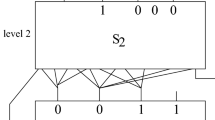Abstract
In this paper we study the consequences of the existence of sparse hard sets for NP and other complexity classes under certain types of deterministic, randomized, and nondeterministic reductions. We show that if an NP-complete set is bounded truth-table reducible to some set that conjunctively reduces to a sparse set then P=NP. We next show that if an NP-complete set is bounded truth-table reducible to some set that randomly reduces (via a co-rp reduction) to some set that conjunctively reduces to a sparse set then RP=NP. Finally, we prove that if a coNP-complete set reduces via a nondeterministic polynomial time many-one reduction to a co-sparse set then PH=Θ p2 . On the other hand, we show that nondeterministic polynomial time many-one reductions to sparse sets are as powerful as nondeterministic Turing reductions to sparse sets.
Work done while visiting Universität Ulm. Supported in part by an Alexander von Humboldt research fellowship.
Preview
Unable to display preview. Download preview PDF.
Similar content being viewed by others
References
L. Adleman and K. Manders. Reducibility, randomness and intractability, In Proceedings of the 9th ACM Sympos. Theory of Computing 151–163.
E. Allender, L. Hemachandra, M. Ogiwara, and O. Watanabe. Relating equivalence and reducibility to sparse sets. Proceeding 6th Structure in Complexity Theory Conference, 1991.
[AHH+92] V. Arvind, Y. Han, L. Hemachandra, J. Köbler, A. Lozano, M. Mundhenk, M. Ogiwara, U. Schöning, R. Silvestri, and T. Thierauf. Reductions to sets of low information content. In Proceedings of the 19th International Colloquium on Automata, Languages, and Programming. To appear.
V. Arvind, J. Köbler, and M. Mundhenk. Bounded truth-table and conjunctive reductions to sparse and tally sets. Ulmer Informatik Berichte 92–01, 1992.
J. Balcázar, R. Book, and U. Schöning. Sparse sets, lowness and highness. SIAM J. Comput., 15:739–745, 1986.
J.L. Balcázar and U. Schöning. Logarithmic advice classes. Bericht 9/88, Informatik, EWH Koblenz, to appear in Theoretical Computer Science.
P. Berman. Relationship between density and deterministic complexity of NP-complete languages. In Proceedings of the 5th International Colloquium on Automata, Languages, and Programming, pages 63–71. Springer-Verlag Lecture Notes in Computer Science #62, 1978.
L. Berman and J. Hartmanis. On isomorphisms and density of NP and other complete sets. SIAM Journal on Computing, 6(2):305–322, 1977.
H. Buhrman, L. Longpré, and E. Spaan. personal communication, 1992.
S. Even, A. Selman, and Y. Yacobi. The complexity of promise problems with applications to public-key cryptography. Information and Control, 61:114–133, 1984.
S. Fortune. A note on sparse complete sets. SIAM Journal on Computing, 8(3):431–433, 1979.
F. Hausdorff. Grundzüge der Mengenlehre. Leipzig, 1914.
S. Homer and L. Longpré. On reductions of NP sets to sparse sets. In Proceedings of the 6th Structure in Complexity Theory Conference, pages 79–88. IEEE Computer Society Press, June/July 1991.
N. Immerman and S. Mahaney. Relativizing relativized computations. Theoretical Computer Science, 68:267–276, 1989.
J. Kadin. Restricted Turing reducibilities and the structure of the polynomial time hierarchy. PhD thesis, Cornell University, 1988.
R. Karp and R. Lipton. Some connections between nonuniform and uniform complexity classes. In Proceedings of the 12th ACM Symposium on Theory of Computing, pages 302–309, April 1980.
J. Köbler, U. Schöning, S. Toda, J. Torán. Turing machines with few accepting computations and low sets for PP. Journal of Computer and System Sciences, Vol. 44, No. 2, pp. 272–286, April 1992.
R. Ladner, N. Lynch, and A. Selman. A comparison of polynomial time reducibilities. Theoretical Computer Science, 1(2):103–124, 1975.
S. Mahaney. Sparse complete sets for NP: Solution of a conjecture of Berman and Hartmanis. Journal of Computer and System Sciences, 25(2):130–143, 1982.
M. Ogiwara and O. Watanabe. On polynomial-time bounded truthtable reducibility of NP sets to sparse sets. SIAM Journal on Computing, 20(3):471–483, June 1991.
D. Ranjan and P. Rohatgi. Randomized reductions to sparse sets. In Proceedings 7th Structure in Complexity Theory Conference. To appear.
L.G. Valiant and V.V Vazirani. NP is as easy as detecting unique solutions. Theoretical Computer Science, 47(1):85–93, 1986.
K.W. Wagner. More complicated questions about maxima and minima, and some closures of NP. Theoretical Computer Science, 51(1):53–80, 1987.
G. Wechsung and K.W. Wagner. On the boolean closure of NP. Manuscript. (Extended abstract by: G. Wechsung, On the boolean closure of NP, in Proc. 1985 International Conference on Fundamentals of Computation Theory, pages 485–493. Lecture Notes in Computer Science, Springer-Verlag, 1985.)
Author information
Authors and Affiliations
Editor information
Rights and permissions
Copyright information
© 1992 Springer-Verlag Berlin Heidelberg
About this paper
Cite this paper
Arvind, V., Köbler, J., Mundhenk, M. (1992). On bounded truth-table, conjunctive, and randomized reductions to sparse sets. In: Shyamasundar, R. (eds) Foundations of Software Technology and Theoretical Computer Science. FSTTCS 1992. Lecture Notes in Computer Science, vol 652. Springer, Berlin, Heidelberg. https://doi.org/10.1007/3-540-56287-7_101
Download citation
DOI: https://doi.org/10.1007/3-540-56287-7_101
Published:
Publisher Name: Springer, Berlin, Heidelberg
Print ISBN: 978-3-540-56287-0
Online ISBN: 978-3-540-47507-1
eBook Packages: Springer Book Archive




